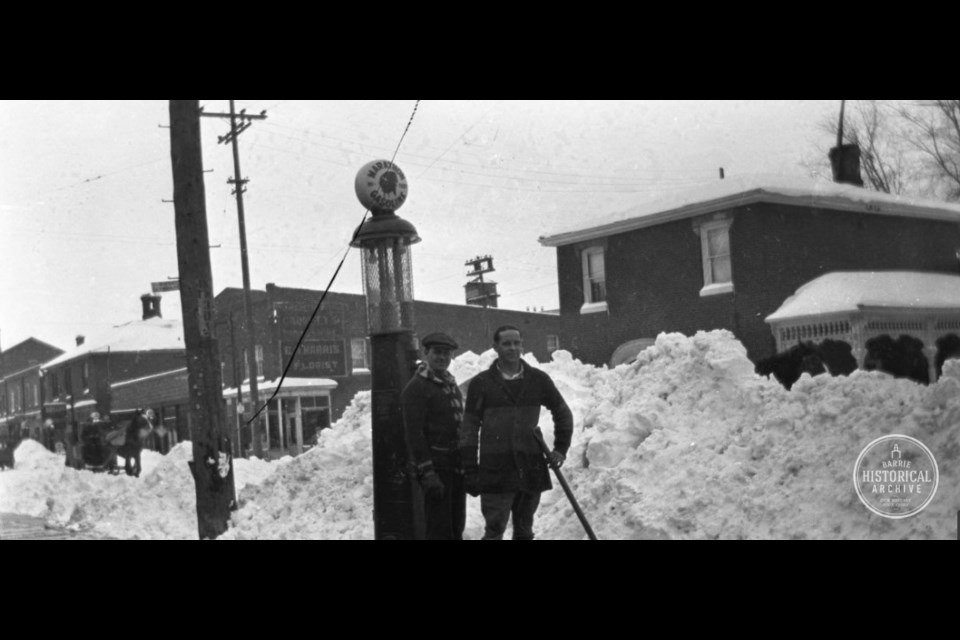Fred Grant's stories have a conversational feel to them. It is almost as if this self-described old-timer pulled up a chair next to you in a coffee shop and started sharing tales of a Barrie that no longer exists.
These are not stories about the grander events in town, although they are mentioned as well, but reminiscences of the more ordinary times that the citizens of Barrie would have experienced in a long-gone era.
By 1921, Fred Grant had been away from Barrie, his hometown, for three decades. His trade as a printer had brought to the west coast where he was employed by the Daily Times & Colonist in Victoria, B.C. He began to send little snippets of Barrie memories to his former employer, the Barrie Examiner, and was surprised at how much interest these stories generated among the readers.
Fred Grant had plenty to say about everything Barrie related but, as we settle into the post-Christmas winter season, I thought it might be interesting to see what Mr. Grant recalled about cold weather days in the past.
Some of these anecdotes seem to be stretches of the truth, perhaps lifted from a page torn out of the book of uphill, both ways, in my pajamas. Myself, I believe them to be quite true which makes me very thankful that I live in era of well-heated homes.
“People who complain about the cold weather in Ontario nowadays have no idea about real cold weather, says one of those grizzled old authorities. Why, way back in the ‘70s in Ontario the thermometer sank to 45 degrees below zero regularly and remained at that level for several days.”
Of course, Mr. Grant was referring to the 1870s, the era of his boyhood, in this piece published in the Barrie Examiner in 1927. It is chilling, quite literally, to note that 45 degrees below zero Fahrenheit is nearly on par with the same number in Celsius. Brrrr.
“The before breakfast shave was carried out only after thawing out a chunk of ice on the kitchen stove for hot water. We often awoke in the morning to find shoes and other things frozen to the floor. I’ve seen it so cold that water only a few feet from a red hot stove would freeze solid.”
I hate to admit it but the following paragraph seems perfectly accurate to me. The rural road south of Barrie, on which I grew up in the 1970s, was exactly as Mr. Grant describes here. In recent years, it barely snows there at all.
“We do not get as heavy a snowfall now either. In 1885, it snowed so heavily that persons riding in railway coaches couldn’t see a thing except an unbroken wall of snow rising up on either side of the car. Farmers had to dig trails through the immense drifts and, when they drove through, all that could be seen was the horses’ ears above the snow line.”
Even 102 years ago, elder statesmen like Fred Grant were having their recollections of earlier Canadian winters challenged.
“There are incredulous persons who maintain that the winter seasons are as invariable as all processes of nature, and that taking one season with another, there is very little variation in the temperature, and the memory of the old timer fondly dwells upon one particularly cold, snowy winter and confuses it with all the other winters that have since passed.”
Naysayer beware. Fred Grant had proof. He was no ordinary yarn spinner but a newspaperman who had been keeping a journal since childhood.
“In looking over a diary I kept as a boy, I find that I was skating on Bunker’s Creek north of Bradford Street on December 1, 1886, and three days later, Dec. 4, was cutter riding with congenial company, and on Dec. 5, was skating on Kempenfelt Bay.”
Fred Grant’s pieces usually always included a poem or two. Whether they were his own work or borrowed, I’m not sure. This is a segment of one titled Old-Fashioned Winter.
How dear to my heart is the old-fashioned winter,
The kind that we thought had clean melted away,
It brings back the days of the sleds and the snowballs,
Before December got mixed up with May.
Each week, the Barrie Historical Archive provides BarrieToday readers with a glimpse of the city’s past. This unique column features photos and stories from years gone by and is sure to appeal to the historian in each of us.



